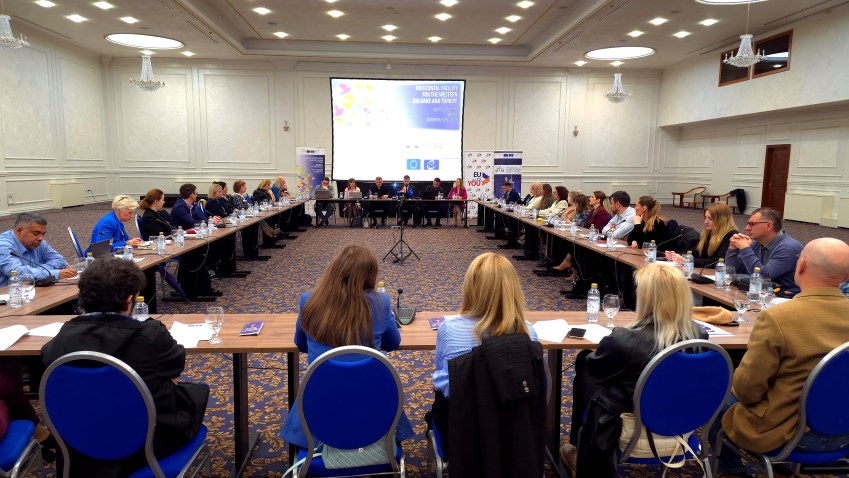The 16th meeting of the National Co-ordination Body for the implementation of the Law on Free Legal Aid (NCB), gathered in Skopje to discuss the most important challenges regarding the functioning of the free legal aid system in North Macedonia.
Supported by the European Union and the Council of Europe’s joint programme, “Horizontal Facility for the Western Balkans and Türkiye,” and in close co-operation with the Ministry of Justice, the event gathered around 40 participants in person and around 25 participants online. They represent the key institutions (and members of this body) in the field of free legal aid including the Ministry of Justice and its Regional Offices (ROs), Bar Association, lawyers, civil society organisations (CSOs) and legal clinics authorised for providing free legal aid. The event was also attended by judges from the Administrative Court, representatives of the Agency for Real Estate Cadastre and UNDP.
In his opening speech the Deputy Minister of Justice, Alen Dereban, emphasised the importance of access to justice for everyone, through providing free legal aid for those who cannot afford it. “The rule of law is a fundamental principle of every modern state. One of the key aspects of this principle is ensuring access to justice for all. The importance of free legal aid is confirmed by statistics themselves. Just in the past year, 5,030 of our citizens received primary legal aid through the Ministry of Justice, authorised associations, and legal clinics." mentioned Deputy Minister.
Oleg Soldatov, Head of the Council of Europe Programme Office in Skopje, extended sincere gratitude to the legal aid providers and beneficiary institutions for their good cooperation and active involvement in the meetings of this body, highlighting their important role in guaranteeing access to justice in line with Article 6 of the European Convention on Human Rights.
Discussions focused on several pressing issues, including the planning the budget for the costs of legal aid provided under the Law on Free Legal Aid within the Ministry of Justice and the issue about the need for implementation of Article 11 of the Law on Free Legal Aid (funding of authorised CSOs and Legal Clinics). Concerns were raised about the Ministry of Justice’s failure to implement this legal obligation over the past three years.
In addition, the representatives of the Agency for Real Estate Cadastre informed the participants about the necessary preconditions for electronic access to the Agency for the authorised persons within the Ministry of Justice when collecting information on the property owned by the applicant of secondary legal aid. The participants agreed that electronic access to this database would significantly simplify their work and enhance their efficiency.
The discussion also covered the novelties set in the new Law on Justice for Children concerning the remuneration of the legal aid lawyers and the challenges in practice, as well as the situation concerning the Law on Expertise and the process of adoption of the tariff for expert witness services.
Additionally, the participants once again emphasised the need to begin a broad, transparent, and inclusive process for further amending the Law (second phase), in line with previous NCB conclusions.
The action “Towards a consolidated and more efficient Free Legal Aid (FLA) system in North Macedonia” is part of the “Horizontal Facility for the Western Balkans and Türkiye”, a joint European Union and Council of Europe programme implemented by the Council of Europe. The action will keep supporting the National Co-ordination Body on free legal aid in order to achieve better co-ordination and communication among the main actors in the free legal aid system in future.


